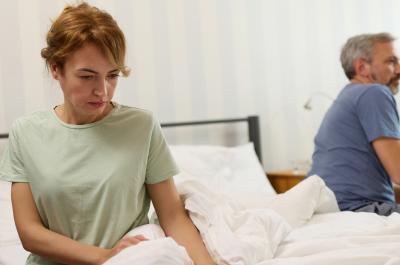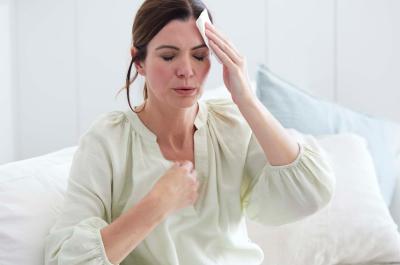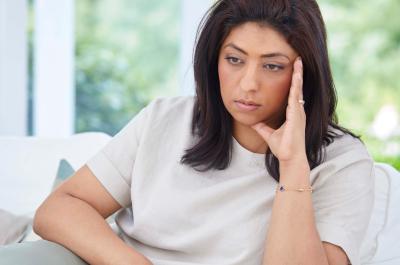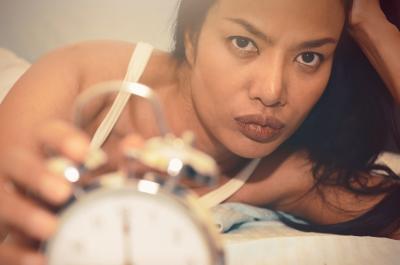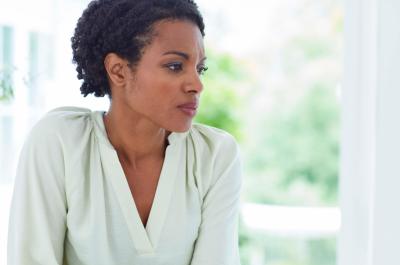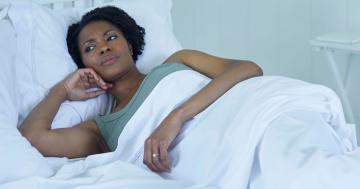
As you approach menopause, you may experience a few physical changes. You may have heard other women describing headaches, aches and pains, heart palpitations, or weight gain.
Read on to learn about some of these reported menopause symptoms and some wellness tips to help you manage them better.
Sleeping difficulties
Approaching menopause can lead to disruption to your normal sleep patterns and is thought to be linked to the fall in estrogen which can cause hot flashes at night known as night sweats.1 Studies indicate that taking estrogen supplements can reduce sleep disturbances through decreasing hot flashes.
Of course, menopause is not the only cause of sleep problems and sleep quality generally deteriorates with age for both sexes. It’s also possible to experience disturbed sleep due to health issues such as:
- sleep apnea (a sleep disorder where breathing stops)
- restless legs syndrome
- anxiety
- depression
- stress2
Should you find you’re having a hard time getting a good night’s sleep, you can try to do a few things to help wind down at the end of the day and improve your sleep environment, like:
- try to sleep in a comfortably cool and quiet room
- try to go to bed around the same time every night
- create a bedtime routine, like taking a bath or reading to help wind down
- avoid caffeine close to bedtime3
If you still find you can’t fall asleep or sleep through the night regularly, you can pay a visit to your healthcare professional to look into any potential sleep disorders or health conditions causing these restless nights.
Headaches
Hormones influence so many things, and when their levels change, they can affect our bodies in several ways. Hormonal headaches are just one example of this, and you may have even experienced them right around the time you get your period. Headaches are also a common symptom for women approaching menopause.4
If you’ve experienced “hormone-sensitive” migraines around your period in the past, then you may be more likely to get them during perimenopause as well. They can be caused by a drop in estrogen which occurs during the menopause transition and around periods in younger women.5 Some women who experience migraines may find their migraine frequency will peak in their 40s, but once they have gone through menopause (when they have not had a menstrual cycle for 12 months), migraines generally tend to improve.6
If you get frequent headaches, which interfere with your daily life, talk to your healthcare professional to determine the cause and rule out any other health issues. They can also help you find the appropriate treatment method for headaches or migraines.
Aches and pains
Hormonal changes during perimenopause can leave you with more aches and pains than before. Estrogen protects the joints and reduces inflammation, so when estrogen decreases as you approach menopause, inflammation can also increase and cause achy or painful joints. Although a drop in estrogen around menopause may cause conditions like osteoarthritis, factors like age, genetics, obesity, and diabetes also come into play.7
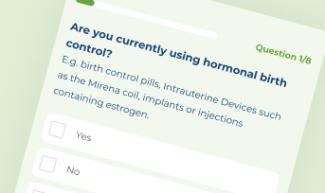
Is Clearblue® Menopause Stage Indicator right for me?
Take our simple quiz to find out!
Regular low impact exercised like walking if your healthcare professional recommends it can be helpful in keeping aches and pains away.
Breast tenderness
As breast tissue is sensitive to hormones breast tenderness is common during perimenopause, when estrogen and progesterone levels change quite unpredictably. However, the experience of breast pain will vary between women, as some may just feel slight tenderness, other soreness or burning sensations. Whereas some may even experience a stabbing, sharp, or even throbbing pain. Sometimes, breast tenderness appears in only one breast, but sometimes it can be felt in both.8
The good news is that breast pain seems to decrease after menopause. A UK study that looked at women who reached natural menopause by age 54 found that while around 40 percent of perimenopausal women aged 47 experienced breast tenderness, only 8.5 percent of women reported breast tenderness once they reached menopause.9
Heart palpitations
Heart palpitations can include missed, irregular, or exaggerated heartbeats. Although heart palpitations is not exclusive to menopause with studies showing a significant increase in peri and postmenopause groups versus women in premenopause.10 However, the cause is uncertain, especially because palpitations as a menopause symptom are much less understood when compared to others, like hot flashes.11
Because palpitations do seem to be more prevalent for women in menopause and postmenopause, it is thought that there is a possible link to changes in estrogen during the menopause transition, but studies remain inconclusive.10 You may feel your heart rate go up or palpitations that can even continue after you’ve not had a period for 12 months, but always see your healthcare professional if you notice this symptom.
Weight gain
Weight gain is often thought of as a menopause symptom, and although several studies have investigated the connection between body composition, weight, and hormone changes, results are inconsistent. Studies have shown a correlation between weight gain and menopause. One study has claimed that the hormonal imbalance during menopause, with decreased estrogen and increased androgen levels, promotes more fat accumulation around the stomach area.12 But this study, among others, also stated that body mass composition and weight changes around menopause are also closely linked to lifestyle factors such as diet, exercise, or alcohol consumption.13
However, there still could be an indirect connection between weight gain and menopause, as there are menopause symptoms that can directly impact these lifestyle factors. For example, frequent night sweats lead to poor sleep quality, which can affect how active you are in your daily life.
Also, another factor to think about is that menopause can also cause water retention. Decreased levels of estrogen associated with menopause could change how the body regulates water and may cause the number on the scale to go up.14
In conclusion, the link between menopause and weight gain isn’t entirely clearcut. Although there may be some links between weight gain and hormonal changes, it seems that lifestyle also plays an role. Following a healthy diet, being physically active, and getting a good night’s sleep could help manage your weight around menopause. Talk to your healthcare professional if you are concerned about weight gain for advice on how to manage it.
Hair loss
As you approach menopause, you may also notice some changes in your hair. As hormone levels change during menopause, particularly with the significant reduction in estrogen and progesterone, hair growth can slow down, and hair may become thinner. This decrease in estrogen and progesterone also trigger the increased production of androgens such as testosterone. These hormones usually categorized as male hormones, which is responsible for shrinking hair follicles, causing hair loss (and can trigger facial hair growth).15
However, other factors such as stress and lack of nutrients may also contribute to hair loss. Fortunately, this type of hair loss is not necessarily permanent for women, and you can help combat hair loss by reducing stress and living a healthy lifestyle. You can also talk to your healthcare professional to see if you are taking any medication that could contribute to hair loss or to get checked out for any nutrient deficiencies.15
Brittle nails
Brittle nails—nails that flake or split easily—affect up to 20 percent of the population, but mainly women over age 50. Women in postmenopause are particularly prone to brittle nails. This is believed to be partly caused by to a decrease in cholesterol in the nail plate.16
Nutrient supplementation may help improve the quality of your nails. Biotin has been shown to increase nail thickness by 25% in women who took the supplement for 6 to 9 months.17 Another potential cause of brittle nails is calcium deficiency, which menopause is known to cause.18 Always talked to your healthcare professional before taking a supplement or vitamins for menopause to make sure it is right for you.
- Murphy PJ, Campbell SS. Sex hormones, sleep, and core body temperature in older postmenopausal women. Sleep. 2007; 30(12):1788-94.
- https://www.healthline.com/health/sleep/disorders#treatment (accessed March 2023)
- https://www.nia.nih.gov/health/sleep-problems-and-menopause-what-can-i-do (accessed March 2023)
- Hodson, J.; Thompson, J.; Al-Azzawi, F. (2000). Headache at menopause and in hormone replacement therapy users. Climacteric, 3(2), 119–124. doi:10.3109/13697130009167613
- Pavlović JM. The impact of midlife on migraine in women: summary of current views. Womens Midlife Health. 2020 Oct 6;6:11. doi: 10.1186/s40695-020-00059-8. PMID: 33042563; PMCID: PMC7542111.
- MacGregor, E Anne (2006) Migraine and the menopause. The Journal of the British Menopause Society, 12(3), 104–108. doi:10.1258/136218006778234048
- http://www.menopause.org/for-women/expert-answers-to-frequently-asked-questions-about-menopause/women-s-health-and-menopause-faqs (accessed March 2023)
- https://www.mymenopausecentre.com/symptoms/breast-tenderness/ (accessed March 2023)
- Mishra Gita D, Kuh Diana. Health symptoms during midlife in relation to menopausal transition: British prospective cohort study BMJ 2012; 344.
- 1Carpenter JS, Sheng Y, Elomba C, et al. A systematic review of palpitations prevalence by menopausal status. Curr Obstet Gynecol Rep 2021; 10: 7–13.
- Ying Sheng; Janet S. Carpenter; Charles D. Elomba; Jennifer S. Alwine; Min Yue; Caitlin A. Pike ;Chen X. Chen; James E. Tisdale; (2021). Review of menopausal palpitations measures . Women's Midlife Health, (), –. doi:10.1186/s40695-021-00063-6
- Chopra S, Sharma KA, Ranjan P, Malhotra A, Vikram NK, Kumari A. Weight Management Module for Perimenopausal Women: A Practical Guide for Gynecologists. J Midlife Health. 2019 Oct-Dec;10(4):165-172. doi: 10.4103/jmh.JMH_155_19. PMID: 31942151; PMCID: PMC6947726.
- Gold, Ellen B. (2011). The Timing of the Age at Which Natural Menopause Occurs. , 38(3), 425–440. doi:10.1016/j.ogc.2011.05.002
- Stine Julie Tingskov, Henricus A.M. Mutsaers, Rikke Nørregaard, Chapter Eleven - Estrogen regulates aquaporin-2 expression in the kidney, Editor(s): Gerald Litwack, Vitamins and Hormones, Academic Press, Volume 112, 2020, Pages 243-264, ISSN 0083-6729, ISBN 9780128208090, https://doi.org/10.1016/bs.vh.2019.08.016.
- https://my.clevelandclinic.org/health/diseases/16921-hair-loss-in-women (accessed March 2023)
- Reinecke, J. K., & Hinshaw, M. A. (2020). Nail health in women. International journal of women's dermatology, 6(2), 73–79. https://doi.org/10.1016/j.ijwd.2020.01.006
- Chessa MA, Iorizzo M, Richert B, López-Estebaranz JL, Rigopoulos D, Tosti A, Gupta AK, Di Chiacchio N, Di Chiacchio NG, Rubin AI, Baran R, Lipner SR, Daniel R, Chiheb S, Grover C, Starace M, Piraccini BM. Pathogenesis, Clinical Signs and Treatment Recommendations in Brittle Nails: A Review. Dermatol Ther (Heidelb). 2020 Feb;10(1):15-27. doi: 10.1007/s13555-019-00338-x. Epub 2019 Nov 20. Erratum in: Dermatol Ther (Heidelb). 2020 Jan 22;: PMID: 31749091; PMCID: PMC6994568.
- Pariath K, Nair PA. A Cross-Sectional Study on the Dermatoses in Postmenopausal Patients at a Rural-Based Tertiary Health Care Center. Indian J Dermatol. 2019 Sep-Oct;64(5):360-365. doi: 10.4103/ijd.IJD_204_19. PMID: 31543529; PMCID: PMC6749754.

Experiencing symptoms like period changes & hot flashes?
Clearblue® Menopause Stage Indicator with FREE-to-download app makes it easy to track your symptoms and helps you take control of your menopause journey

